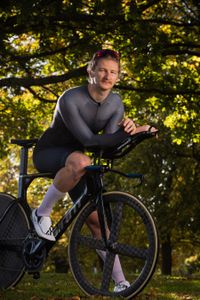‘There’s no motor-doping at highest level, but the UCI hasn’t convinced fans,’ says Jean-Christophe Péraud
The UCI’s former motor-doping investigator has shared his thoughts


The UCI carried out hundreds of motor doping tests at the Giro d'Italia (Picture: Getty Images /AFP/Fabrice Coffrini)
The UCI has not convinced fans that motor-doping doesn’t exist, according to Jean-Christophe Péraud.
The Frenchman, who worked as the UCI’s lead investigator on mechanical cheating, says he is convinced the practice is not present at cycling’s highest level.
Péraud, second-place finisher in the 2014 Tour de France before his retirement in 2016, served as the governing body’s ‘manager of equipment and the fight against technological fraud’ until he was dismissed in late June, according to L’Equipe.
Last month, the French authorities announced they had stopped investigating mechanical doping.
The UCI has responded by saying the fight against technological fraud has been a priority in recent year.
Péraud said: “I’m aware there’s no cheating at the highest level of competition.”
“[But] the UCI has not succeeded in guaranteeing to the general public that this cheating doesn’t exist. There’s nothing more difficult than proving something that doesn’t exists and there’s still doubt in the mind of the public.”
The latest race content, interviews, features, reviews and expert buying guides, direct to your inbox!
French police carried out a two-year investigation after Femke Van den Driessche had been caught at the World Cyclocross Championships in 2016, the first high-level rider to ever test positive for having a bike with an engine in it, while a 42-year-old amateur was then caught in a smaller race in October 2017.
However, the National Financial Prosecutor’s Office (PNF) has now closed the case, report l’Équipe, while the UCI has also concluded its partnership with the French Atomic Energy Commission (CEA), who had been developing miniature thermal scanners to detect motors.
Last year, the UCI announced it had carried out 1,300 “rigorous” motor doping tests at the Giro d’Italia, using magnetic scanning and X-ray technology to monitor bikes.
During the three weeks of the Giro, 1,312 tests were carried out before stages using magnetic scanners and a further 113 X-ray tests were held at the finish lines.
All the tests came back negative.
Péraud’s role has now been made redundant by the UCI, he told French media, due to cost-cutting within the international governing body.
A statement from the UCI said: "The fight against technological fraud has been one of the priorities of the Union Cycliste Internationale (UCI) for several years. The integrity of our competition results and the reputation of our sport are at stake. Increased resources have been deployed with the arrival of David Lappartient as President of our Federation."
The organisation confirmed that Péraud had been let go due to save money, adding: "The UCI will continue to seek to innovate, develop and invest to combat new and future technologies which compromise our sport’s integrity.
"We salute the expertise and commitment of Jean-Christophe Péraud over these two and a half years, thank him for his contribution to the credibility of our sport, and wish him every success in his future responsibilities.”
Alex Ballinger is editor of BikeBiz magazine, the leading publication for the UK cycle industry, and is the former digital news editor for CyclingWeekly.com. After gaining experience in local newsrooms, national newspapers and in digital journalism, Alex found his calling in cycling, first as a reporter, then as news editor responsible for Cycling Weekly's online news output, and now as the editor of BikeBiz. Since pro cycling first captured his heart during the 2010 Tour de France (specifically the Contador-Schleck battle) Alex covered three Tours de France, multiple editions of the Tour of Britain, and the World Championships, while both writing and video presenting for Cycling Weekly. He also specialises in fitness writing, often throwing himself into the deep end to help readers improve their own power numbers. Away from the desk, Alex can be found racing time trials, riding BMX and mountain bikes, or exploring off-road on his gravel bike. He’s also an avid gamer, and can usually be found buried in an eclectic selection of books.
